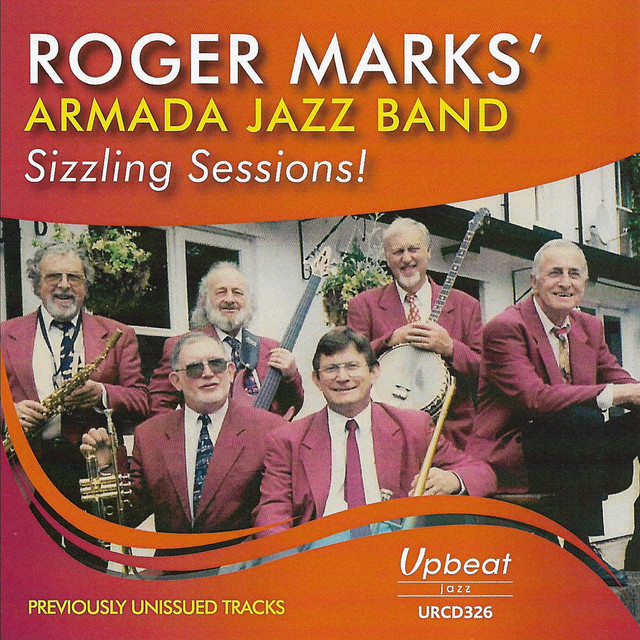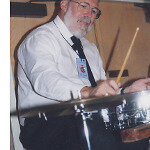 In his notes to this CD, Roger Marks informs us all of these tracks, recorded on cassettes and CDs, had lain forgotten in a cake tin for years. Although they come from live sessions back in 2001, he found enough of sufficient quality to assemble this CD.
In his notes to this CD, Roger Marks informs us all of these tracks, recorded on cassettes and CDs, had lain forgotten in a cake tin for years. Although they come from live sessions back in 2001, he found enough of sufficient quality to assemble this CD.
As a glance at the tune list shows, almost all the selections are “war horses” or trad. “standards,” except for the swing classic “Hawaiian War Chant,” the song “You’re Just in Love” from the Broadway musical Call Me Madam, and the rather obscure “On the Moors.” Of these three anomalies, only the first two are familiar to me; the last I had never before encountered. “Hawaiian War Chant” opens with a tom tom figure, as do those other renditions I am familiar with, such as Tommy Dorsey’s, then after a couple of times through, goes into swing with solos. Drums tend to stay on toms throughout in low volume, increasing that somewhat in the out choruses as the band reverts to the opening sequence. “You’re Just in Love” is a show tune given a jazz treatment, and “On the Moors” is a dark mood instrumental piece on alto sax accompanied by the rhythm section only.
The band’s approach to the standards is one which includes various devices which renders them “different” and thus interesting. The first track, “Original Dixieland One-Step,” is taken at a bright clip with very nice descending arpeggios taken by front line, each instrument holding its note while the others come in as they do in turn. There are also unexpected elongated glissandos by the trombone. Ending the piece is a 4-bar drum tag—the only one on this disc. (Lesser bands—and/or drummers—would have fallen prey to adding such to almost every tune, especially any taken up tempo.)
On the second track, “Snake Rag,” the chromatic descending runs are taken cleanly by trumpet and clarinet, and the trumpet solo is backed only by off-beat stop time first time through. The breaks, usually taken by a single instrument, are here different and interesting by their being taken by more than one instrument simultaneously.
One could go on to describe in detail what is happening on each of the cuts, but I will limit myself to a glimpse of just a couple of others. Marks displays both agility and inventiveness on his instrumental track “Somebody Stole My Gal.” He is “all over the trombone,” one might say, and for the entire three and a half minutes the track lasts, he improvises without repeating himself as well as deftly handling the tonguing and slide with sureness. Aspiring trombonists could take notes from this cut. “My Bucket’s Got a Hole in It” is taken at what I would call a medium tempo, not the slow one at which other bands often perform it.
The last track, “Salutation March,” is a fitting concluding tune. The band follows what is by now a fairly standard arrangement, the three strains along with their repeats being played first in the 6/8 time signature, then switching to 2/4 and staying on the third strain in that time signature through to the coda. Following the ensemble rendition of third strain after the switch, there are three solos—by trumpet, sax, and trombone, the last named being backed by stop-time the first time through. The band returns to ensemble after the trombone solo, taking the tune out. This is a spirited version, the tempo being just a tad on the bright side after the time signature switch, but it never does get out of control and everyone seems to be quite comfortable, no faux pas being detectable. The Marks group’s rendition does the piece proud here..
Since all of the tracks on this CD were recorded “on the job” with little or no chance of remixing or touching up, one might expect some audio problems, but there are none of these, really. However, there are a few other small “flaws.” On “Somebody Stole My Gal” Whitlock comes dangerously close to running away with the tempo as he solos when Marks takes down, but fortunately he manages to resist until Marks comes back in. Also, some of the tempos seem to be a bit too fast, too frantic, as in, for example, ”Fidgety Feet” and “Travellin’ Blues” (a,k,a, “Weary Blues”). Part of traditional jazz’s raison d’être is to be music for dancing, but I doubt many people would or could take to the floor to try to dance to these. But despite their tempos, no train wrecks occur. Another small slipup is the omission of the name of the vocalist on the two vocal tracks; “Curse of an Aching Heart” and “My Bucket’s Got a Hole in It.” No one is credited anywhere on the insert. But these are all minor cavils.
It is fortunate that Marks came across these recordings, took the trouble to save them for posterity, and allowed them to be issued, most for the first time and a few for a second after a first very limited issue. They are, as the title proclaims, “sizzling sessions.” All Marks fans will want to have this CD and, for those unacquainted with the Armada Jazz Band, it will provide a fine introduction. It was clearly a good spring in 2001 for the band.
Along with other Upbeat CDs, this one can be had from the Upbeat Recordings’ web site www.upbeatmailorder.co.uk and from other web sites such as Amazon.
Sizzling Sessions
Roger Marks’ Armada Jazz Band
Upbeat URCD 326
Personnel:
Roger Marks, trombone; John Shillito, trumpet; Ken Rennison, soprano and alto sax; John Whitlock, banjo and guitar; Bob Jarvis, bass guitar; Denny Hutchinson, drums.
Born in Dundee, Scotland, Bert Thompson came to the U.S. in 1956. After a two-year stint playing drums with the 101 st Airborne Division Band and making a number of parachute drops, he returned to civilian life in San Francisco, matriculating at San Francisco State University where he earned a B.A. and an M.A. He went on to matriculate at University of Oregon, where he earned a D.A. and a Ph.D., all of his degrees in English. Now retired, he is a professor emeritus of English at City College of San Francisco. He is also a retired traditional jazz drummer, having played with a number of San Francisco Bay Area bands, including And That’s Jazz, Professor Plum’s Jazz, the Jelly Roll Jazz Band, Mission Gold Jazz Band, and the Zenith New Orleans Parade band; he also played with some further afield, including Gremoli (Long Beach, CA) and the Phoenix Jazzers (Vancouver, B.C.) Today he reviews traditional jazz CDs and writes occasional articles for several publications.























